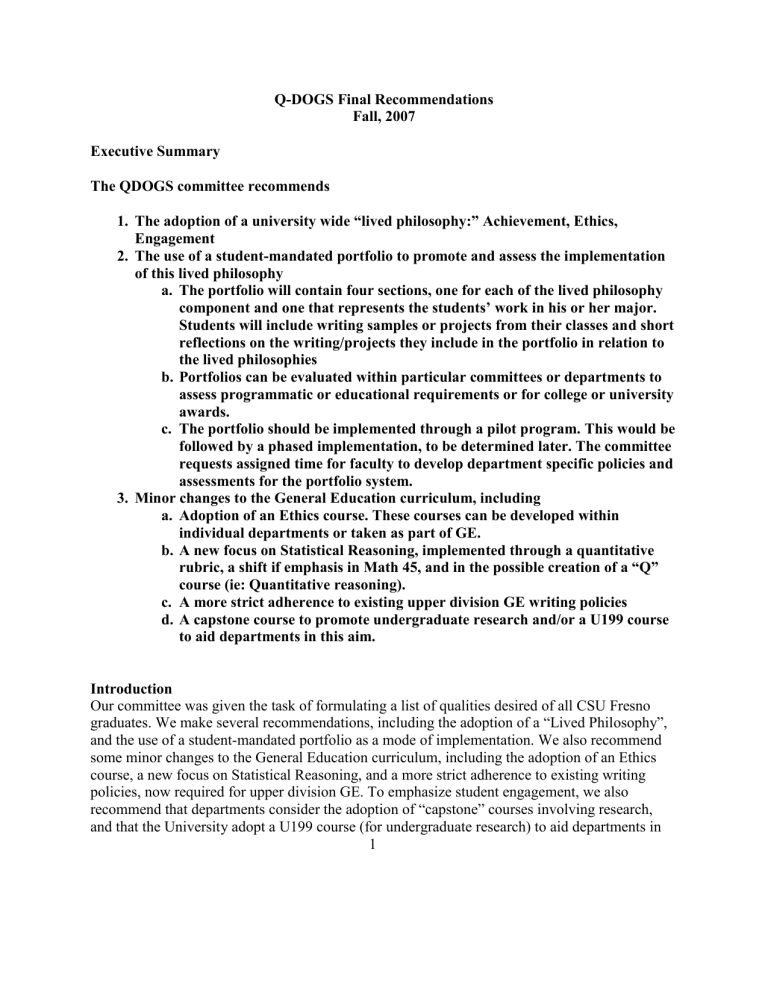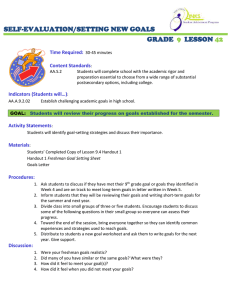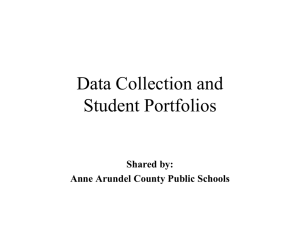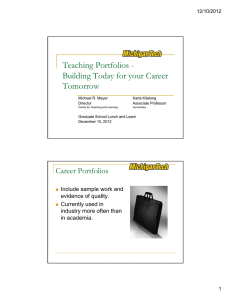Q-DOGS Final Recommendations Fall, 2007 Executive Summary

Q-DOGS Final Recommendations
Fall, 2007
Executive Summary
The QDOGS committee recommends
1.
The adoption of a university wide “lived philosophy:” Achievement, Ethics,
Engagement
2.
The use of a student-mandated portfolio to promote and assess the implementation of this lived philosophy a.
The portfolio will contain four sections, one for each of the lived philosophy component and one that represents the students’ work in his or her major.
Students will include writing samples or projects from their classes and short reflections on the writing/projects they include in the portfolio in relation to the lived philosophies b.
Portfolios can be evaluated within particular committees or departments to assess programmatic or educational requirements or for college or university awards. c.
The portfolio should be implemented through a pilot program. This would be followed by a phased implementation, to be determined later. The committee requests assigned time for faculty to develop department specific policies and assessments for the portfolio system.
3.
Minor changes to the General Education curriculum, including a.
Adoption of an Ethics course. These courses can be developed within individual departments or taken as part of GE. b.
A new focus on Statistical Reasoning, implemented through a quantitative rubric, a shift if emphasis in Math 45, and in the possible creation of a “Q” course (ie: Quantitative reasoning). c.
A more strict adherence to existing upper division GE writing policies d.
A capstone course to promote undergraduate research and/or a U199 course to aid departments in this aim.
Introduction
Our committee was given the task of formulating a list of qualities desired of all CSU Fresno graduates. We make several recommendations, including the adoption of a “Lived Philosophy”, and the use of a student-mandated portfolio as a mode of implementation. We also recommend some minor changes to the General Education curriculum, including the adoption of an Ethics course, a new focus on Statistical Reasoning, and a more strict adherence to existing writing policies, now required for upper division GE. To emphasize student engagement, we also recommend that departments consider the adoption of “capstone” courses involving research, and that the University adopt a U199 course (for undergraduate research) to aid departments in
1
this regard.
A “Lived Philosophy”
We recommend the university adopt the following “lived philosophy”, as a means to tie together activities scattered among the GE courses and the various majors. Although the main categories for this philosophy have many revisions, our committee has settled on the following:
Achievement
Ethics
Engagement
This represents an abbreviation of our earlier suggestion of EPACE (Ethics, Passion,
Achievement, Courage, Engagement). An addendum to this proposal outlines a list of directives for students, related to these desired qualities, and the range of qualities discussed by the committee of which AEE is a distillation. One goal in developing this directive is to show to students, in a single page, what they must do to excel in these categories. The list is by no means complete, and we welcome suggested edits from faculty and administrators.
The Portfolio
To focus students’ attention on the above-mentioned qualities, we also recommend that all students be required to maintain an electronic portfolio, comprised of at least four components, one for each of the "lived philosophy" areas, and a fourth component illustrating the application of one or more of these areas. Our suggestions for the portfolios are as follows:
1. Format - Portfolios would be required of all students and would consist of four sections. Three sections would be comprised of samples of class work that exemplify each of the three areas of
Achievement, Ethics and Engagement. A fourth component would include an example, or multiple examples of work within the major, perhaps in relation to a Culminating Experience (or
Project), illustrating some aspect of all three qualities.
2. Content - We recognize that conscientious students and faculty already have significant workloads. Our desire is not to increase workload, but rather to focus attention on certain goals.
We propose that the contents of the portfolio be derived from existing coursework and course requirements, including:
(a) Writing examples derived from assignments in upper division GE courses, and projects of various kinds derived from within a major (e.g., additional writing examples, art projects, research projects, etc.). These writing/project examples may be selected by the student, but may also be nominated by a faculty member to be included in a student portfolio.
(b) Short (1-2 page) self-reflective essays for each component within the portfolio. These self reflective essays could be added at any time, but might best be included when students submit examples of their work to the portfolio. These essays could express where and how students have advanced in each of the AEE areas, perhaps with commentary regarding which classes provided the greatest challenges and means for growth. Essays might be incorporated annually.
2
(c) We encourage departments to add to the portfolio program- or content- specific components, as appropriate. As we discuss under Assessment, we suggest that contentspecific components could be used as an aid for department program reviews, as another source of “data” for faculty, when writing recommendation letters, or as a means for students to “show off” their accomplishments, when applying for jobs, or discussing graduate school options with a potential thesis advisers.
3. Assessment - Though nominally mandatory, we are uncertain as to how the completion of the portfolio might be enforced. For success, every student should be required to complete the portfolio; But how to do so without burdening faculty with additional paperwork, especially if they are in departments with very high enrollments? We thus currently recognize that only a fraction of all portfolios might be assessed.
The Q-DOGS committee could undertake random assessments of portfolios, at first determining whether the intent of our recommendations is being realized. To encourage compliance, we suggest that the university consider a number of incentives:
The university could track the number of “hits” to students’ e-portfolio sites, and indicate to students that if the number of “hits” is low, this will increase the likelihood that their portfolio will come under an “audit” (i.e., the Q-DOGS selection of portfolios might contain a non-random element).
DARS might make use of this information (numbers of hits to a students’ portfolio website) to place limits on class registration (e.g., students might lose registration priority), or place a graduation hold.
Departments may devise some means to require students to show evidence of progress on the portfolio during mandatory advisement sessions, which currently focus on a review of
departmental road maps.
The General Education Committee might consider periodic assessment of portfolios as part of its outcomes assessment plan for the general education program
We further suggest that portfolios be incorporated into other mandatory evaluation efforts, and that they may indeed even aid such efforts. Thus portfolios could be used
(a) as a means for department program (e.g., the 5-year) reviews.
(b) for university-level assessment, as complemented by NSSE and other examination tools.
(c) for qualification to become a nominee as a Deans’ medalist, and/or other department- and university-wide student awards.
(d) as a basis for the granting of additional awards. These awards could take the form of an
“Achievement Award”, an “Ethics Award” and an “Engagement Award”, and could be evaluated by the Q-DOGS (or other) committee members.
(e) when students ask individual faculty members for a recommendation letter, for graduate school or employment.
4. Implementation. We recognize that although our intent is to bring a philosophical coherence to
3
the university and its academic goals, it is unclear that the portfolio will be successful. We close with two final observations/suggestions:
(a) We suggest a trial phase, where preliminary assessments of portfolios by Q-DOGS, along with input from faculty and students will lead to modifications of these recommendations.
(b) The trial would be followed by a phased implementation schedule, to be determined at a future date.
(c) We have attempted to minimize the impact to faculty and students (i.e., we anticipate that the delivery will be “low-cost”). But we also recognize that the development phase will require significant time, especially as departments that lack a culminating experience or project, attempt to develop one. We suggest that the Deans and the Provost consider allowing 2-3 units of release time to faculty willing to volunteer to develop appropriate department-level protocols for the portfolios, and to conduct preliminary assessments.
Additional Recommendations
A. General Education
The committee is largely satisfied with GE as it stands, and with two exceptions, is more concerned with implementation of existing policies, rather than structure or content. In particular, we believe the writing requirement in upper division GE is important, and urge that checks be put in place to ensure that all faculty teaching upper division GE courses understand and follow the GE writing requirement.
In regard to content, we see two areas that should be addressed:
1) Ethics
• All students should enroll in an Ethics-focused course, offered either by their home department, or taken as part of GE. These courses should offer a societal component, but professional disciplines (Engineering, Health Sciences) are encouraged to develop their own courses to meet students’ professional needs (e.g., Criminology or Engineering).
• We suggest that individual departments be at liberty to transform existing courses, or create new courses (for GE, or in the major) to address issues of Ethics. Students may satisfy the requirement by taking an “E-course” from any other department, as a part of the GE curriculum.
2) Quantitative Reasoning
(a) Mathematics, like writing, should be practiced widely across the GE curriculum.
(b) Statistical reasoning should be mandatory in MATH 45.
(c) The university (and/or the MATH department) should adopt a “Quantitative Rubric,” which would include statistical reasoning, and would be required of certain GE courses
(the sciences, social sciences), and recommended for all others.
(d) The university might also consider a call for designated Q-courses (for “Quantitative” reasoning).
4
Like writing, a quantitative rubric could be adopted by all GE courses offered in the colleges of
Engineering, Science and Mathematics, Agriculture, Social Sciences, Education, Business, and
Health and Human Services, and might even find application to areas in Arts and Humanities.
The university might also consider a call for designated Q-courses (for Quantitative reasoning).
With advisement from the chair of the Mathematics department, the committee also recommends that the statistical reasoning component in the area B4 course MATH 45, which is currently optional, becomes mandatory.
B. Writing
To the extent that the university is unsatisfied with the writing skills of our students, we recommend a more thorough implementation and renewed focus on existing writing policies, presently required by all upper division GE.
C. Engagement
The university should encourage engagement by creating a University 199 course, which would serve as a “senior” thesis project, to be used by any department on campus that has as yet to create its own research-oriented culminating experience. We recognize that some very large departments may have difficulty in implementing individual senior theses, and in such cases we recommend the use of group projects, which are already in use in some departments.
D. Other recommendations are also related: in an examination of undergraduate physics programs, Hilborn and Howes (2003) noted that successful programs were “challenging, but supportive and encouraging” and were leaders in “undergraduate research participation.” We encourage the university to adopt and continue, where relevant, the qualities of thriving
“programs,” which as Hilborn and Howes, (2003) showed, have:
• “well developed…advisement and mentoring,” especially regarding career opportunities
• an “undergraduate research program”
• “opportunities for student-faculty interactions”
• “a strong sense of community”
• students acting as “team members in department efforts, such as outreach to the public and K-12 schools”
The university has already undertaken a significant effort to mandate advising, and increases mentoring opportunities. Departments might be encouraged to implement the remaining policies noted above if such policies were addressed in departmental 5-year reviews.
5
Addendum I
Directives to Students
ACHIEVEMENT
Students should
• Have a commitment to learning and be curiosity driven.
• Go above and beyond minimum requirements in all classes.
Read assignments with thought, and ahead of the class schedule.
Write papers that are thoughtful, and clearly written with proper grammar.
Engage in research or other projects that reach beyond minimum expectations
• Use critical thinking skills, such as
The scientific method
Rhetorical analysis
• Exhibit passion about their major, their education, their career goals.
• Study 2-3 hours per in-class lecture hour.
ETHICS
Students should exhibit ethical behavior at all times; within the university, the following areas are of particular relevance:
• Professional ethics
Follow the campus honor code
Proper citations of others’ works (avoid plagiarism).
Integrity of work
Ethics in research practices
• Social ethics
Exhibit respect and courtesy towards others
Accept the responsibilities expected of educated citizens
Act as role models to others
ENGAGEMENT
Students should
• be involved in service learning (education with a community service focus)
• take learning beyond the CSU Fresno campus
• work with people with different backgrounds and experiences
• recognize we are part of a larger (global) community
• be involved in professional societies
• view education with some peripheral vision; look for connections between various courses, or between coursework and life outside the university
• be engaged: read the newspaper, vote in elections, visit museums, attend lectures and musical events.
• exhibit courage in your personal and education choices. Don’t be afraid to fail.
6
Members of the committee are:
Rita Bocchinfuso-Cohen
Virginia Crisco
James Farrar
Gregory Kriehn
Maxine McDonald
Dennis Nef
Paula Popma
Keith Putirka (Committee Chair)
Susan Schlievert
Martin Shapiro
Martín Valencia
Addendum II
Earlier members not on the final committee include:
Priscilla Chaffe-Stengel
Honora Chapman
David Schecter
7




